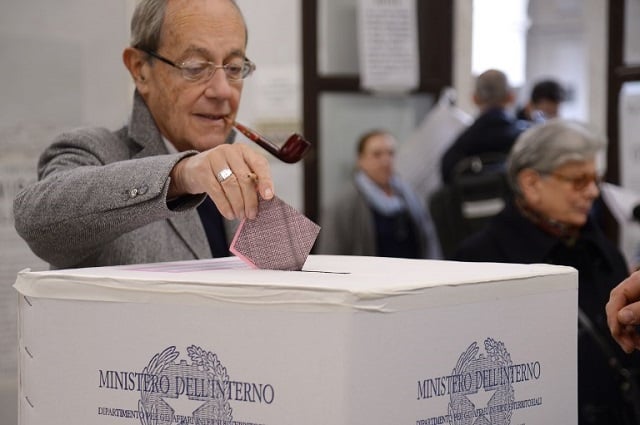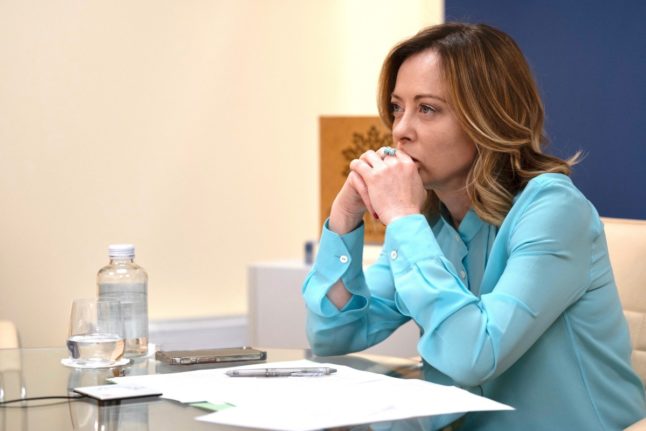In this unstable political environment, politicians across the spectrum have been extravagant in their promises to voters, keen to win favour after low voter turnout in the most recent regional elections.
In his New Year’s address, President Sergio Mattarella urged parties to put forward proposals that were “adequate, concrete, and realistic”, and later in January criticized politicans for making “irresponsible” promises.
This year’s election will take place using a never before tested electoral law which favours cross-party alliances, and this has some interesting implications. For the first time, more than a third of seats will be awarded through a first-past-the-post system, encouraging parties to build up strong bases of support in certain areas.
- How does Italy's new electoral law work?
- Your guide to Italy's 2018 general election
- An introduction to Italy's small political parties
And because the next government will almost certainly be a coalition, parties may be inclined to promise voters what they want in the run-up to the election, knowing they can blame their eventual coalition partners if they can’t follow through on these pledges.
A recent poll by Index Research showed that almost 80 percent of Italians believed none of the election policies made would become reality. Across social media, the pledges have been parodied under the hashtag ‘#AboliamoQualcosa’ or ‘let’s abolish something’ in which Twitter and Facebook users have called for everything from socks with sandals to vegan bolognese to be scrapped.
We’re keeping track of the key election promises made by each party so far.
Democratic Party

Matteo Renzi, pictured giving a speech after handing in his resignation in December 2016. Photo: Andreas Solaro/AFP
Minimum wage: Party secretary Matteo Renzi wants to increase the minimum wage of salaried employees to €9-10 per hour, a measure which would affect around 15 percent of the Italian workforce (others are covered by sector-specific collective agreements). The party would also continue its focus on incentivizing businesses to offer permanent contracts and reducing unemployment.
European Union: The Democratic Party and its pro-EU allies are calling for the creation of a “United States of Europe,” for the president of the European Commission to be elected by a Europe-wide direct vote, and for the creation of a finance minister for the eurozone. The centre-left bloc wants migrants to be distributed among the EU states and is also pushing for integration measures proposing that for “every euro invested in security, a euro should be invested in culture.”
Migration: The party says it will push to change EU rules that oblige countries where migrants land to process their applications to stay. It also wants to withhold EU funding from member states that refuse to take in migrants. Separately, it plans to pursue its stalled plan to create an earlier path to citizenship for children of foreign parents born and schooled in Italy.
Baby bonus: The Democrats say they will give parents child benefits of €400 a month, per child, for up to three years, followed by tax breaks until the child reaches 18. There would also be a tax cut for young people who leave home before the age of 30.
Scrap TV licence fee: Renzi has said he plans to get rid of the tax used to fund state TV network Rai.
READ ALSO: Understanding Italy's Democratic Party
Five Star Movement

Recently elected leader of the Five Star Movement, Luigi Di Maio. Photo: Marco Bertorello/AFP
Repeal 400 laws in first year of power: Long having described itself as Italy's anti-establishment party, the M5S's first move will be to get rid of hundreds of the laws introduced by previous administrations. Writing on his predecessor Beppe Grillo's blog, party leader Luigi Di Maio said: “The Five Star Movement will abolish, in the shortest time possible, 400 useless laws.” This, he said, would create a fairer and less complex tax system and cut down on bureaucracy, allowing businesses to grow more easily and to reduce tax evasion. Di Maio has even set up on online portal where voters can nominate the laws they'd like to see scrapped.
Euro: The Five Star Movement's official programme, presented on January 21st, included a pledge to keep the euro. This is a turnaround as the party has always been highly critical of the single currency and for years called for a referendum on it, though in recent months leader Luigi Di Maio said this would be a “last resort”.
Universal basic income: The programme calls for wage support for working-age Italians and a minimum pension for all retirees, guaranteeing everyone a monthly income of at least €780 per month. It also proposes lowering the age of retirement.
Migration: Their solution to the migrant crisis is to sign bilateral agreements with the countries of origin for the repatriation of undocumented immigrants.
Scrap compulsory vaccinations: In May last year, the Democratic Party made 12 vaccinations compulsory for school starters across the country, including those against measles and meningitis, with a fine for any parents to break the law. This followed a threefold rise in measles cases in Italy in one year, which was linked to a growing number of parents refusing the vaccines despite scientific evidence of their efficacy. Speaking on Rai radio in January, Di Maio said the party would “change” this law, and that the M5S wanted to remove the obligation for parents to vaccinate their children.
Free nappies: The movement hopes to win the family vote by offering to reimburse childcare costs and nappies.
READ ALSO: Italy's Five Star Movement faces familiar problems ahead of the election
Forza Italia

Forza Italia leader Silvio Berlusconi. Photo: Andreas Solaro/AFP
A flat tax: Speaking on Italian TV, former PM and Forza Italia leader Silvio Berlusconi pledged that his party would introduce a flat tax, and has described this as a “fundamental point” of his programme. This would start at 23 percent, which is currently the minimum rate in a progressive tax system that rises to 43 percent, but Berlusconi said he hopes to reduce this rate if tax revenue rises.
EU: The Italian constitution would trump EU legislation under the plan put forward by Berlusconi and his coalition partners the Northern League and Brothers of Italy. However, Berlusconi has also said that Italy will keep the euro as a currency and pledged to respect the EU’s budget deficit ceiling of 3 percent of national output.
Scrap taxes on cars, primary homes, businesses, and inheritance: Berlusconi also called for these taxes to be abolished.
Higher minimum pensions: Forza Italia would hike minimum pensions to €1,000 per month, double the current amount. The party also wants to set aside special pension benefits for mothers. Other pledges aimed at gaining the elderly vote include free dental and eye care for Italy's older generation.
Tax breaks for pet owners: Berlusconi has recently reinvented himself as an animal rights campaigner; last Easter, he was filmed cuddling lambs saved from slaughter for the traditional holiday meal, and he's spoken about the “happy family” of dogs, horses and sheep at his Milan villa. The billionaire has called for a stop to VAT on pet food and free vet visits to make life easier for Italy's many pet-owners.
The League

Northern League leader Matteo Salvini. Photo: Gabriel Buoys/AFP
Immigration: Party leader Matteo Salvini has promised to deport 100,000 undocumented migrants within a year of taking power. Part of his plan is to stretch limits on the amount of time migrants can be held in detention centres, making it easier to eventually return them to their country of origin.
Euro: The League is part of Berlusconi's centre-right coalition, and the Forza Italia leader said Salvini had “changed his position” on the euro, which he has long called for Italy to leave. However, The League's economics spokesman, Claudio Borghi, promptly disagreed, telling Italian television that “one second after the League is in government it will begin all possible preparations to arrive at our monetary sovereignty. It's a question of national security.”
EU: Salvini hasn't ruled out taking Italy out of the European Union if the bloc won't agree to exempt Italy from some of its financial rules.
A flat tax: A flat tax has been part of the League's platform for years, and the party claims it would set the rate at just 15 percent. According to Salvini, any loss in tax revenue by lowering the rate would be offset by a reduction in tax evasion. He also wants new penalties for tax evaders, including confiscating their driving licences or passports for up to three years.
Pension reform: The League wants to cancel the current government's pension reforms and lower the retirement age.
Reopen Italy's brothels and tax them: Speaking on January 15th, Salvini repeated an earlier vow to reopen Italy's brothels, which were criminalized 60 years ago, and said he was “increasingly convinced” of the merits of such a measure. The League has several times proposed legislation to legalize prostitution, but these laws have never been passed. Italy's GDP sees a significant rise if revenue from illegal activities included prostitution are included, and Salvini's argument is that taxing prostitution would boost the Italian economy. In fact, a proposal for the creation of red light districts in Italian cities was in 2016 supported by senators from the Democratic Party, Forza Italia, and the Five Star Movement.
Scrap compulsory vaccinations: Like the M5S, the League plans to revert Health Minister Beatrice Lorenzin's law making several vaccinations compulsory for children starting at a state school.
Scrap tax on e-cigarettes: Salvini said the League planned to cancel Italy's tax on electronic cigarettes, labelling the tax “absurd”.
Military service: The League wants to bring back at least six months' compulsory military service for young men and women.
Free daycare: The party has promised to provide state-funded childcare free of charge.
READ ALSO: Political cheat sheet: Understanding Italy's Northern League
The minor parties
Italy is home to plenty of small parties who could find themselves in the role of kingmaker if none of the major parties receives an outright majority – an outlook that seems extremely likely. Here are their pledges.
Brothers of Italy
This right-wing party, the smallest in the centre-right coaltion, has pledged to “defend the traditional family” with a programme to encourage people to have children, while opposing same-sex marriage or adoption. It also promises to put “Italians first” by prioritizing native Italians' access to social services over foreign residents' and limiting the number of non-Italian children per classroom.
This group was formed in December, made up of anti-Renzi leftwing splinter groups which left the Democratic Party. Pietro Grasso, the party's leader, has proposed the abolition of public university tuition fees, scrapping Renzi's Jobs Act (which made it easier for companies to hire and fire employees), increasing benefits for Italy's poorest and reducing the gender wage gap. It also wants to promote green energy and to legalize gay marriage and adoption.
READ ALSO: An introduction to Italy's small political parties



 Please whitelist us to continue reading.
Please whitelist us to continue reading.